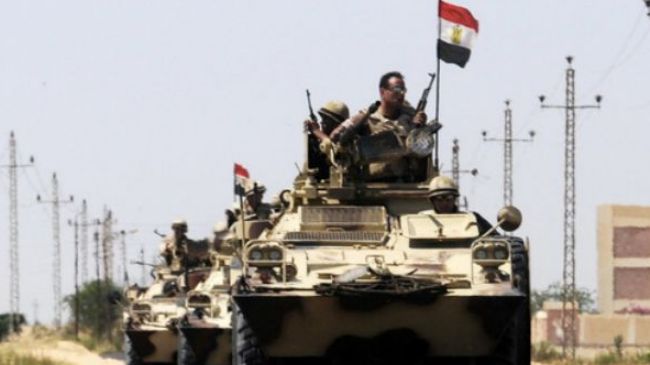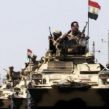
Can the Sinai’s Bedouin Become a Counterterrorist Force?
Publication: Terrorism Monitor Volume: 11 Issue: 20
By:

Egypt’s North Sinai region is becoming an increasingly fierce site of conflict between the Egyptian military and local and Gaza-based militant Salafist organizations. The area’s most powerful Bedouin tribes, al-Tarabin, al-Sawarka and al-Tiyaha, form a majority of North Sinai’s population and are vital participants in the fighting. Egyptian security forces and Bedouin leaders have discussed, but not consummated, a framework through which Bedouin tribal forces could be mobilized and supported by the Egyptian state to confront the rise of militant Salafism amongst Bedouin tribal youth (Associated Press, October 8, 2012).
Sinai’s Bedouin population maintains several social, economic and political grievances against the Egyptian state (for more information and analysis on insecurity caused by these grievances see Terrorism Monitor, May 18, 2012). One of the drivers of these grievances is the Egyptian state’s reported unwillingness to allow Sinai Bedouin to study in police and military colleges or become members of the Egyptian military (IRIN, June 16, 2011). As a result, there is not a significant local Bedouin presence in the Egyptian security forces that are posted in the Sinai, further emphasizing the divide between Egyptian security and military forces and the local population in issues pertaining to Sinai’s security (Ahram Online [Cairo], May 13).
In spite of this state policy, the Egyptian state has consistently sought to enlist the support of local Bedouin tribes to provide security in the post-Mubarak period. Bedouin in North Sinai supplemented Egyptian Ministry of the Interior forces in protecting 75 polling stations during the 2012 Egyptian presidential election cycle (McClatchy, May 20, 2012). After the launch of the August 2012 Operation Eagle campaign, North Sinai politicians called for then President Mursi and Defense Minister General Abd al-Fatah al-Sisi to approve the organization of a 500-person tribal militia under the supervision of the Interior Ministry, to protect roadways and government buildings (al-Masry al-Youm [Cairo], November 5, 2012; see Terrorism Monitor, September 27, 2012).
As a result of insecurity in North Sinai following the abdication of President Mubarak, al-Sawarka and al-Tarabin, tribal shaykhs agreed to resolve their inter-tribal disputes and begin to work together to provide security in the region (al-Masrawy [Cairo], February 19, 2012). Al-Sawarka shaykhs announced that they would mobilize “Popular Committee” militias composed of al-Sawarka tribesmen to patrol the Egypt-Gaza border as well as in the area in and around al-Arish to prevent the movement of HAMAS fighters from Gaza into Sinai (al-Dustur [Cairo], June 28).
One particular Bedouin leader, al-Sawarka Shaykh Ibrahim al-Manei, one of the most powerful leaders of the Sawarka Bedouin, has been a particularly vocal advocate for cooperation between the Egyptian military and Sinai Bedouin (al-Ahram [Cairo], May 29). Citing the example of Iraqi Kurdish peshmerga (armed Kurdish fighters) militias, Shaykh Ibrahim has called for the formation of a 1,000 fighter North Sinai inter-tribal defense force. This Bedouin security force would be mobilized under the command of Sinai tribal leaders and would be authorized by the Egyptian Interior Ministry to patrol public places and border areas, man checkpoints on roadways and keep the peace among feuding Bedouin tribesmen (Ahram Online [Cairo], May 13; AP, October 8, 2012).
Egyptian authorities in the Mubarak era sought to subvert the local authority of Sinai Bedouin shaykhs by attempting to co-opt them as active participants in intelligence gathering against their fellow tribesmen. Local Bedouin assert that 150-200 Bedouin shaykhs throughout Sinai, particularly in North Sinai, were co-opted by state security services, reportedly contributing to intra-tribal tension (Associated Press, October 8, 2012). Following President Mubarak’s abdication in February 2011, inter-tribal North Sinai Bedouin youth created a popular civil society organization, the “Youth Revolution Council in Sinai,” which petitioned and failed to convince Egyptian President Muhammad Mursi and the Supreme Council of the Armed Forces (SCAF) to implement as state policy the direct election of Sinai Bedouin tribal shaykhs (al-Akhbar [Beirut], August 21, 2012).
The shaykhs of North Sinai have also become the targets of threats and violence directed against them by disgruntled fellow tribesmen and militant Salafist fighters, a number of whom are believed to be members of local Bedouin tribes. It is reported that eight North Sinai Bedouin shaykhs have been assassinated in the post-Mubarak era. These shaykhs are believed to have had strong ties to Egyptian state security or to have been vocal advocates of tribal mobilization against militant Salafist fighters based in the Sinai (al-Masry al-Youm [Cairo], September 5, 2013).
North Sinai Bedouin leaders are also constrained in their cooperation with the Egyptian state due to the membership of their tribesmen in local militant Salafist organizations and by popular anger against the state due to the more aggressive military operations launched by Egyptian security forces against militant Salafist groups in North Sinai since President Mursi was deposed on July 3 (see Terrorism Monitor, September 19, 2013; September 6, 2013). The recent Egyptian military offensive in North Sinai is reported to have caused a large amount of destruction of civilian property, the deaths of 52 Bedouin civilians, and the deaths of over 100 members of Egyptian security forces (Slate, October 7; Reuters, September 30).
Shaykh Ibrahim al-Manei, referring to the military’s campaign, told Egyptian freelance journalist Nadine Marroushi that:
Salafist militant fighters in North Sinai have directly challenged the authority of Bedouin leadership by openly calling for the imposition of Islamic law and the abolishment of the practice of Bedouin customary law (al-Ahram [Cairo], April 29, 2012). Two of the most powerful militant Salafist groups in the Sinai, Salafiya Jihadiya (Salafist Jihad) and Ansar Bayt al-Maqdis (Partisans of Jerusalem), are reported to be composed primarily of radicalized Bedouin youth who are given protection by their fellow tribesmen as a result of blood ties. The protection is reportedly provided under Bedouin customary law to the extent that militant Salafist Bedouin fighters do not attack their own kinsmen and instead target “outsiders,” which usually refers to the Egyptian state security forces (al-Akhbar [Beirut], August 21, 2012; see Terrorism Monitor, February 22, 2013). Further threatening the position of those North Sinai shaykhs interested in cooperating with the Egyptian state, Salafiya Jihadiya recently issued a statement in which it threatened to execute Bedouin leaders or tribesmen that provided support to the Egyptian military (al-Masry al-Youm [Cairo], October 4).
The Egyptian military and North Sinai Bedouin tribes have not built sufficient trust in each other to organize a popularly-supported, cohesive and officially empowered local security force. Although there has been evidence of limited cooperation between the Egyptian military and North Sinai Bedouin tribes, core drivers of distrust between the Egyptian state and the tribes have yet to be resolved. This distrust appears to be made worse by the Egyptian military’s more aggressive and destructive posture towards Bedouin communities since the military deposed President Mursi. Due to the lack of a local Bedouin presence in state security forces posted in the Sinai, the history of Sinai Bedouin disenfranchisement by the Egyptian state, current pan-tribal disunity, tenuous intra-tribal leadership and militant Salafist threats against Bedouin who cooperate with local security forces, a “Sinai Sahwa” is unlikely to develop in the foreseeable future.
Nicholas A. Heras is an independent analyst and consultant on Middle East issues and a former David L. Boren Fellow.





